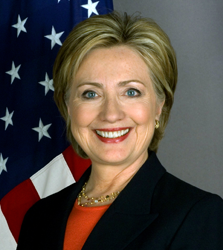
Clinton Campaign Prepares for Southern Knockout of Sanders
The campaign of Democratic frontrunner and former Secretary of State Hillary Clinton is, according to a Politico report this morning, in a shaky position in Iowa – ahead of her main rival, Vermont Sen. Bernie Sanders, but hardly secure in her lead:
Clinton’s tenuous grasp on Iowa
There’s little doubt that Clinton is outpacing the insurgent Vermont senator in Iowa: It’s been four months since Sanders led Clinton in a reliable poll of likely or potential Democratic caucus-goers here. But it’s also been nearly a month since the most recent poll was conducted — a result of pollsters staying out of the field as Iowa voters were focused more on the holidays than on politics.
And while the former secretary of state has led in the past 14 polls conducted by live telephone interviewers, there is another caveat that could give the Clinton campaign pause: In those 14 polls, the only two that show her with a lead of less than 10 points were from The Des Moines Register and legendary Iowa pollster J. Ann Selzer….
Clinton’s lead in Iowa may also be overstated if Sanders is able to draw new voters to the caucuses, particularly college students, as President Obama did in 2008.
David Redlawsk, a Rutgers University professor who is in Iowa as a fellow at Drake University’s Harkin Institute for Public Policy and Citizen Engagement, noted that Sanders is strong in some of the cities and college towns across the state, such as Cedar Rapids, Iowa City and Des Moines.
But he questioned whether Sanders is really building a statewide movement to win delegates across the entire state.
“For Sanders, much of his visible support appears to really be focused around the urban areas,” Redlawsk said.
“Does he have the organization and support outside of those areas? Does he have people ready to caucus for him in Keokuk County?” Redlawsk added, naming one of the most sparsely populated of Iowa’s 99 counties.
Drake University professor Art Sanders suggested another possible analogue: 2000, when former New Jersey Sen. Bill Bradley tried to galvanize college students in Iowa to support his uphill bid for the Democratic nomination.
“Bill Bradley tried the same thing when he ran against Al Gore,” Sanders said. “They didn’t turn out for him, though.”
Sanders might be able to replicate Obama’s feat in 2008, winning Iowa, and may then be well positioned to win New Hampshire the following week as well. But according to a Washington Post piece this morning, the Clinton campaign is prepared and positioned to stop any Sanders momentum once the first two states are out of the way:
Bernie Sanders could win the Iowa caucuses and/or the New Hampshire primary. If that happens, the South stands ready to save Hillary Clinton.
The Democratic primary in South Carolina is Saturday, Feb. 27, and Clinton has a much more comfortable lead than in the first two early states. Then Alabama, Georgia, Oklahoma, Tennessee, Texas and Virginia all vote the following Tuesday, March 1.
Several Republican secretaries of state in the region worked together to move up the contests so that the South would have more clout. While their primary focus in creating “the SEC Primary,” named for the college football conference, was prodding the GOP to choose a more conservative nominee, the unintended result has been to give the Democratic frontrunner a firewall in case things kick off poorly.
“I believe Hillary is a lock to sweep the Deep South,” said Richard Fording, the chair of the political science department at the University of Alabama.
The article goes on to detail the advantages Clinton holds throughout the South, among them:
Clinton has a near monopoly on support from the Democratic establishment in the South. She has spent years improving relationships that were frayed during the brutal battle with Obama, when Bill Clinton bitterly called his candidacy a “fairy tale” and friends like John Lewis, the civil rights hero, defected.
Lewis says he’s backing Clinton “wholeheartedly” this time. So are a bevy of other prominent African Americans from Georgia, including former U.N. Ambassador Andrew Young, Reps. Hank Johnson and David Scott, Atlanta Mayor Kasim Reed and Stacey Abrams, the powerful minority leader of the state House. The campaign rolled out these endorsements in the fall, and the support has shown no signs of fraying….
Sanders has tried with limited success to make inroads in the SEC primary states. The campaign said recently that it will open three field offices in Alabama. “It’s a real uphill battle here,” Juanita Juarez, who had helped gather signatures to put Sanders on the ballot in Alabama, recently told my colleague David Weigel. “There’s a lot of name recognition to get past. People know Hillary; the first time I talk to people about Bernie is usually the first time they’ve heard about him.”
Things can change rapidly during the nomination process, and twin victories in Iowa and New Hampshire by Sanders (or even a close second in Iowa and a win in New Hampshire) could be enough to propel Sanders past the frontrunner. But Clinton has a solid base of support and organization in the states that follow the first few key contests, and at this point Sanders appears to be hoping to draw the political equivalent of an inside straight – historically not the best position to be in.



